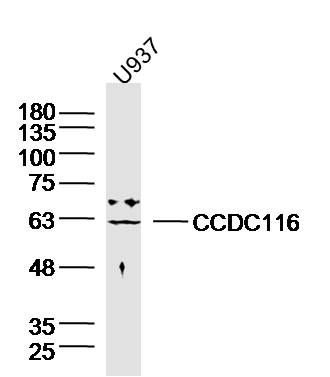产品货号 : mlR8111
英文名称 : CCDC116
中文名称 : 卷曲螺旋结构域蛋白116抗体
别 名 : CC116_HUMAN; Ccdc116; Coiled-coil domain-containing protein 116.
研究领域 : 细胞生物 免疫学
抗体来源 : Rabbit
克隆类型 : Polyclonal
交叉反应 : Human, Mouse, Rat, Dog, Horse,
产品应用 : WB=1:500-2000 ELISA=1:500-1000 IHC-P=1:400-800 IHC-F=1:400-800 IF=1:100-500 (石蜡切片需做抗原修复)
not yet tested in other applications.
optimal dilutions/concentrations should be determined by the end user.
分 子 量 : 57kDa
细胞定位 : 细胞核 细胞浆
性 状 : Lyophilized or Liquid
浓 度 : 1mg/ml
免 疫 原 : KLH conjugated synthetic peptide derived from Human CCDC116:155-260/515
亚 型 : IgG
纯化方法 : affinity purified by Protein A
储 存 液 : 0.01M TBS(pH7.4) with 1% BSA, 0.03% Proclin300 and 50% Glycerol.
保存条件 : Store at -20 °C for one year. Avoid repeated freeze/thaw cycles. The lyophilized antibody is stable at room temperature for at least one month and for greater than a year when kept at -20°C. When reconstituted in sterile pH 7.4 0.01M PBS or diluent of antibody the antibody is stable for at least two weeks at 2-4 °C.
PubMed : PubMed
产品介绍 : CCDC116 is a 515 amino acid protein that exists as two alternatively spliced isoforms. Encoded by a gene that maps to human chromosome 22q11.21, CCDC116 is induced by curcumin (diferulolylmethane), although its role is unclear. CCDC116 is significantly affected by dietary curcumin, which may have a protective role in inflammatory bowel disease (IBD) and may reduce the relapse rate in human ulcerative colitis (UC). As the second smallest human chromosome, chromosome 22 contains over 500 genes and about 49 million bases. Phelan-McDermid syndrome, Neurofibromatosis type 2 and autism are associated with chromosome 22. A schizophrenia susceptibility locus has been identified on chromosome 22 and studies show that 22q11 deletion symptoms include a high incidence of schizophrenia. Translocation between chromosomes 9 and 22 may lead to the formation of Philadelphia Chromosome and subsequent production of a novel fusion protein known as BCR-Abl, a potent cell proliferation activator found in several types of leukemia.
SWISS:
Q8IYX3
Gene ID:
164592
Important Note:
This product as supplied is intended for research use only, not for use in human, therapeutic or diagnostic applications.
产品图片












